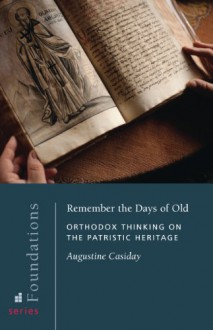Remember the Days of Old: Orthodox Thinking on the Patristic
Heritage (Foundations)
By Dr Augustine Casiday
Baker Books Academic (20 Aug 2014)
ISBN: 0881414913
Price: £11.39 (Amazon UK)
Baker Books Academic (20 Aug 2014)
ISBN: 0881414913
Price: £11.39 (Amazon UK)
In the latest addition to SVS Press’ Foundation Series, Dr
Augustine Casiday covered the multifaceted and sometimes controversial issue of
the Orthodox approach to the Patristic Heritage. The book ‘Remembering the Days
of Old’ covers this issue in a well meaning and scholarly fashion, looking into
the various approaches to Patristics and the transmission of this heritage into
the Church today.
The texts starts by outlining what we mean by a Patristic
Heritage and questioning what it is and what it is not. A key part of this
opening section also looks at modern approaches to Patristics, including that
of the influential Russian thinker Fr. Georges Florovsky in his Neo-Patristic
Synthesis and its profound impact on the study of the fathers. From here,
Casiday uses examples from the fathers to look at how we should approach the
reading of the fathers to help us understand how this heritage of transmission
occurs. This later moves on to other ways of transmitting the Patristic
heritage, such as through the Creed and Symbols, finishing off with an analysis
of how we move forward from this.
The overall feel that this provides allows for the reader to become aquainted with the overall picture of the Orthodox approach to patristics before being submerged into these specific points. This helps with the flow of the texts and makes readable do a degree, regardless of it being a primarily academic piece of writing. As well as this flow, the book uses case studies to prove points. This helps to put the raised ideas in context. A good example of this is the various approaches of fathers of Origen, where Casiday intrododuces the reader to the issue of 'the consensus of the fathers' by displaying various views of Origen, doing the same later for Photius' treatment of the Filioque.
The overall feel that this provides allows for the reader to become aquainted with the overall picture of the Orthodox approach to patristics before being submerged into these specific points. This helps with the flow of the texts and makes readable do a degree, regardless of it being a primarily academic piece of writing. As well as this flow, the book uses case studies to prove points. This helps to put the raised ideas in context. A good example of this is the various approaches of fathers of Origen, where Casiday intrododuces the reader to the issue of 'the consensus of the fathers' by displaying various views of Origen, doing the same later for Photius' treatment of the Filioque.
A weakness which i find in Casiday’s approach comes from the books primarily academic nature. The reason why this can be seen as a weakness is that it
may throw some less academic readers off, especially when comparing this text
to other parts of the foundation series. This means that some readers may struggle in the later sections of the book, especially those who are reading the book to understand the 'foundations' of the Orthodox understanding of the Patristic heritage. Though the book is not designed to be read as an introductory text, this is always an issue and does need to be mentioned.
Regardless of this challenge, Remember the Days of Old is a good and firm text on the Orthodox approach to patristics, and dispels some common misconceptions which tend to emerge regarding the place of the fathers in the Church. Because of Casidays willingness to approach and discuss these common issues, the book is a worthwhile read for those who enjoy patristics and wish to understand how and why we read the fathers and I would certainly recommend it to those with an academic approach to their faith who have struggled to express this to others.
Regardless of this challenge, Remember the Days of Old is a good and firm text on the Orthodox approach to patristics, and dispels some common misconceptions which tend to emerge regarding the place of the fathers in the Church. Because of Casidays willingness to approach and discuss these common issues, the book is a worthwhile read for those who enjoy patristics and wish to understand how and why we read the fathers and I would certainly recommend it to those with an academic approach to their faith who have struggled to express this to others.


No comments:
Post a Comment